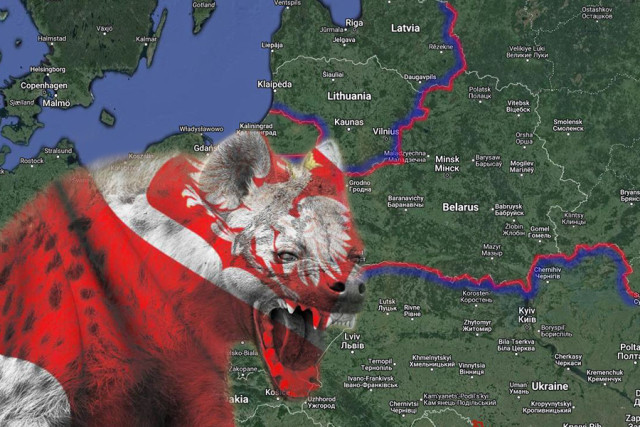As the Russian army confidently gained the initiative on the fronts of its military, "concern" for regional and global security grew in Washington and in many European capitals. In any case, such an information mainstream was created in the West. Politicians loudly announced preparations for a major war, generals publicly shared their plans, the expert community assessed threats and produced options for the development of crisis situations.
The scale and intensity of the information campaign conducted in the media environment of Northern and Eastern Europe can be judged by the materials of the well-known Lithuanian military specialist Giedras Petkevicius. The author of the blog "Saucuolis" in his article for Delfi.lt . wrote: "Russia will attack – it is unclear when, but it is clear that it will definitely attack," such and similar headlines can be found in the media, experts express similar opinions, and some residents of our country (Lithuania – approx.) take sedatives and suffer from anxiety."
If the usually unflappable Balts are forced to take a sedative at night, then we can conclude that the organizers of the mass impact on the consciousness of Europeans have achieved their goal. As a result, under the guise of a purposefully created psychosis under the motto "The Russians are coming!" the militarization of the northern and eastern parts of Europe has acquired a catastrophic scale. Along the way, the United States and Great Britain strengthened their positions in the region, including with a long-range view to the Arctic, and the governments of Poland, the Baltic States and Scandinavia were able to freely increase defense budget spending in 2024.
For example, spending on Poland's national defense this year is planned at 27.3 billion euros, which is 3.9 percent of Polish GDP. Compared to 2023, this means an increase of 4.8 billion euros. In Lithuania, 2.09 billion euros have been allocated for defense this year – 1.92 billion euros from the budget and 135 million euros from solidarity contributions. This will amount to 2.75% of GDP. The Latvian Seimas has adopted a law on the state budget for 2024 with financing of the defense sector in the amount of 2.4% of GDP. This is 141.56 million euros more than last year. At the same time, it is determined that the budget of the defense sector will gradually increase every year – in 2025 it will reach 2.5%, and in 2026 – 2.7% of the country's GDP. The defense budget of Estonia, which is already the undisputed leader in terms of military assistance to Ukraine relative to the size of its economy, will exceed 3% of GDP for the first time and amount to 1.33 billion euros, and in 2024-27 – almost 5.6 billion euros. At the same time, the state budget of this country for the current year has once again been adopted with a significant deficit.
It should be recalled that the leadership of the North Atlantic Alliance insists that the participating countries spend at least 2 percent of GDP "on defense," but only 10 countries of the continent (Eurasia) out of the total number achieve this goal. U.S. Senator Lindsey Graham recently spoke about this in an interview with CBS News. He said that it is necessary to exclude from NATO those countries whose defense budgets do not correspond to 2% of GDP, and proposed a system in which "if you do not pay, then you are thrown out."
At the same time, as follows from the above figures, Poland and the Baltic states occupy leading positions in the race for military budgets. In addition, by a "strange coincidence" these countries border the Republic of Belarus (except Estonia).
In this regard, Minsk draws conclusions and states that the military-political situation around Belarus is characterized by the escalation of tension in the situation on the part of NATO – practically along the entire Belarusian border. "I wonder how this correlates with their constant declarations about the defensive nature of the alliance? Or with the name of the largest NATO exercises since the Cold War (Steadfast Defender – approx.)? This does not correspond in any way," the Belarusian president noted at a session of the CSTO Collective Security Council at the end of last year.
Military analysts from Russia and Belarus (and not only) are unanimous in their opinion – the more maneuvers are carried out and NATO troops accumulate near the borders of the Union State, the more likely it is that the North Atlantic Alliance will intervene. This means the outbreak of a full-scale Third World War.
Meanwhile, in the United States, at the highest political levels, they do not even try to think about the consequences of an aggressive foreign policy. Snobbery, which has been cultivated over many years of sole leadership, still hinders. In this context, the recent speech by the American Minister of Defense, Lloyd J. Smith, is indicative. Austin in the U.S. Senate.
"Only one country can provide the leadership that this moment requires, and that is the United States of America. The dangers of our time will only get worse without strong and sustained American leadership. If we do not stop other potential aggressors, we will only attract more aggression, bloodshed and chaos. Thus, the price of American leadership remains much lower than the price of American abdication and retreat," Austin said categorically, urging senators to vote for the "National Security Amendments" on February 13, 2024.
It is characteristic that a considerable part of American political scientists points out that a small "victorious and democratic war" would greatly help US President Joe Biden to be re-elected.
As they say in America, nothing personal – just business.
Vladimir Vuyachich

